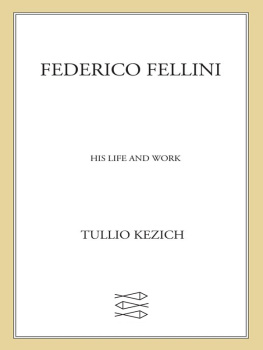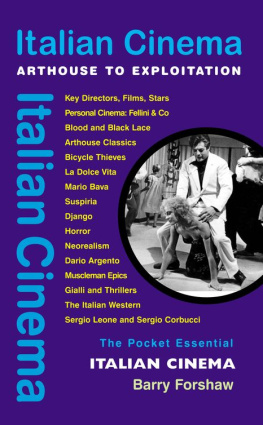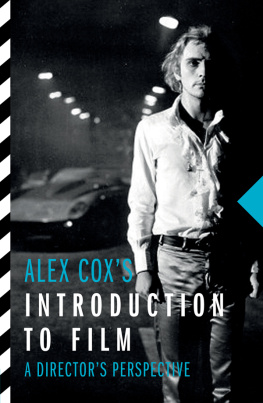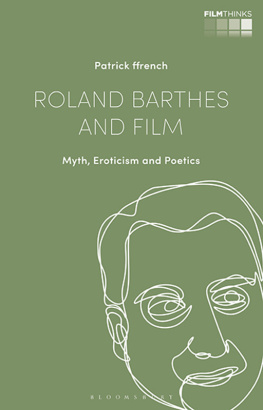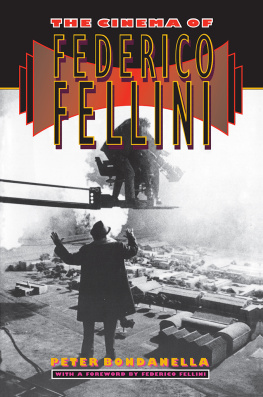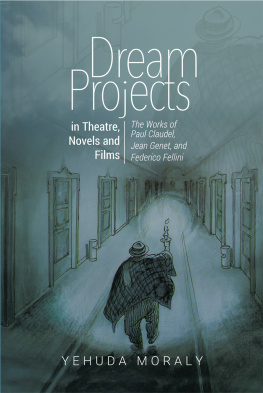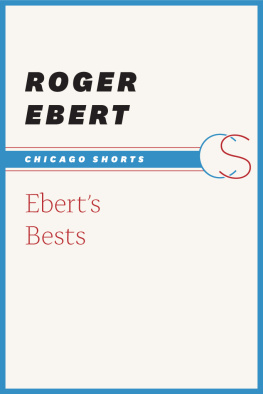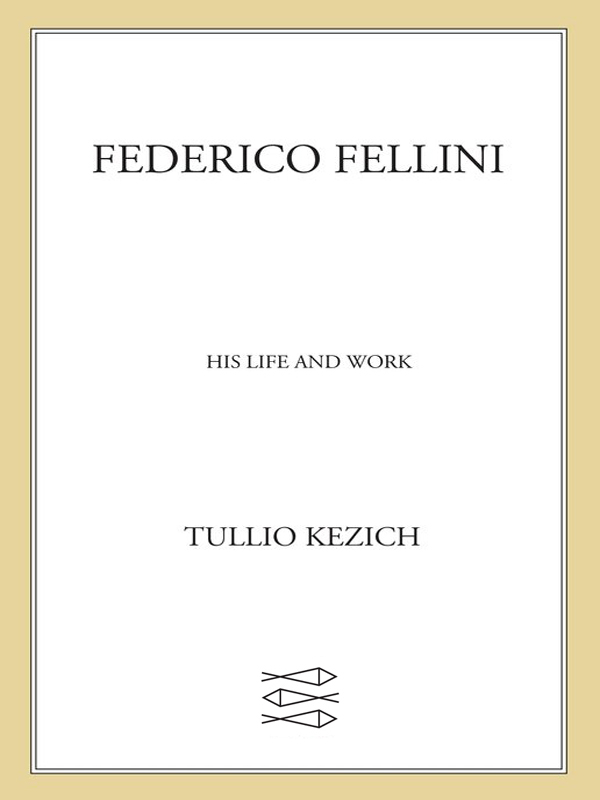This biography is an updated and broad revision of my previous one, Fellini (published by Camunia, May 1987, and Rizzoli, September 1988). My reconstruction of the life and work of the director is based in large part on memories from a friendship that endured for more than forty years and was the source of numerous articles and books written by me both before and after the directors death. Among those, Ill note Su La dolce vita con Federico Fellini (On La dolce vita with Federico Fellini, 1960, expanded edition, 1996); Lintervista lunga in Giulietta degli spiriti (The Long Interview in Giulietta degli spiriti, 1965); Giulietta Masina (1991); Fellini del giorno dopo (Fellini, the Day After, 1996), Primavera a CinecittIl cinema italiano alla svolta della Dolce vita (Springtime in Cinecitt: Italian Cinema in the Wake of Dolce Vita , 1990). Contrary to his habits and claims otherwise, Federico closely monitored the manuscript for the first version of the biography, and he confirmed its validity. Though he would purport to be forgetful, he had an extraordinary memory and never relied on documents. In fact, he kept nothing, not letters, contracts, reviews, photographs. He tore everything up, driven by what he called the murderers complex.
This book is also based on numerous conversations carried out over more than half a century with an endless array of people with any variety of connections to the directornot infrequently, I had those conversations for the pure pleasure of talking about a friend. Its impossible for me to remember all of the interlocutors with whom Ive discussed the events and themes of this biography, but among those who are no longer with us, Id like to recognize with great affection Giulietta, Liliana Betti, Salvato Cappelli, Alain Cuny, Luigi De Laurentiis, Gianni Di Venanzo, Riccardo Fellini, Clemente Fracassi, Piero Gherardi, Luigi Giacosi, Ruggero Maccari, Otello Martelli, Marcello Mastroianni, Alessandro von Normann,Anthony Quinn, Pier Paolo Pasolini, Franois Prier, Enzo Provenzale, Massimo Mida Puccini, Nino Rota, Luigi Rovere, Stefano Vanzina (Steno) And Ill stop there, despite the fact that the list could go on. I should thank many others who are, happily, still alive, as well as the archives, institutes, film libraries, and museums that have allowed me to carry out my research, to watch films, and then to watch them againbut that list would be too long and Im sure Id leave someone out.
I think Ive read, reread, annotated, and occasionally contested almost everything thats ever been printed (article, essay, or book) about the director, which is why Ive avoided bibliographical citations that are already readily available and published elsewhere. Two ample resources, both compiled in 1978, are Barbara Anne Price and Theodore Price, Federico Fellini: An Annotated International Bibliography (Metuchen, N.J. and London: Scarecrow), and John C. Stubbs, Federico Fellini: A Guide to References and Resources (London/Boston: G. K. Hall & Co.). Marco Bertozzis painstakingly accurate three-volume BiblioFellini is in the process of being completed (with the assistance of Giuseppe Ricci and Simone Casevecchia). The first volume came out in 2002, and was published by the Scuola Nazionale di Cinema and the Fondazione Federico Fellini. Peter Bondanellas Federico Fellinis Cinema is rigorous, very well footnoted, and makes good use of the important manuscripts and documents acquired by the Lilly Library of Rare Books at Indiana University. If you are looking for more reading material, do note that certain books that Ive referenced in the pages of this biography should be approached with extreme cautionespecially those authored by women with whom Fellini was romantically involved.
I cant sign off on this newand as far as Im concerned, definitivebiography without thanking those closest to me: Gianfranco Angelucci, Alessandra Levantesi, and Vincenzo Mollica, who pored exhaustively over the manuscript and offered often helpful suggestions. I should also send a very special thanks to my incomparable friend, the late Leopoldo Trieste, who more than half a century ago eased my entry into the Fellini circle.
On the editorial side, I must again express my appreciation to Farrar, Straus and Giroux for their staunch professionalism, and to the careful editing of Denise Oswald.
Tullio Kezich
1856
April 15: Luigi Fellini, Federicos paternal grandfather, is born. Hes a farmer and a shopkeeper.
1860
July 12: Francesca Lombardini, Fellinis paternal grandmother, is born in SantAngelo di Gatteo.
1866
Riccardo Barbiani, Fellinis maternal grandfather, is born in Rimini. He moves to Rome July 18, 1885, and starts a wholesale egg business.
1870
April 14: Maddalena Leali, Fellinis maternal grandmother, is born in Rome. She dies in 1909.
1883
Early in the year, probably in the parish of Balignano, Luigi Fellini marries Francesca Lombardini. Five children are born to the couple: Agostina Elvira (August 16, 1884, the only one who will live her whole life in Gambettola), Leo (August 29, 1887; he dies January 4, 1947), Ida (April 11, 1889; she dies December 2, 1945), Urbano (February 27, 1894; Fellinis father), and Domenico (called Federico; born July 5, 1896; died on the battlefield October 27, 1918). The Fellini family has a dairy farm and a small general market on via Sopra Rigossa.
1896
November 4: Ida Barbiani, Fellinis mother, is born in Rome.
1915
Urbano moves to Rome and works as an apprentice baker at the pastificio Pantanella. He falls in love with his neighbor on via Manin, Ida Barbiani.
1917
The match between Ida and Urbano is vehemently opposed by the Barbiani family, and the couple flees Rome for Urbanos parents home in Gambettola.
1918
August 19: Civil marriage between Urbano and Ida (the religious ceremony will be held on January 22, 1919, at Santa Maria Maggiore in Rome).
1919
At the end of the year, the Fellinis move to Rimini, where Urbano begins working as a traveling salesman and wholesale vendor.
1920
January 20, 9:30 p.m.: In Rimini, in the Fellini home on viale Dardanelli 10, Federico is born. The Fellinis move temporarily to Rome but return shortly thereafter to Rimini, where they move three times, from corso dAugusto to via Gambalunga to via Clementini.
1921
February 22, 8:15 a.m.: In San Giorgio di Piano, Bologna, on via Umberto I number 24, Giulia (later Giulietta) Anna Masina is born to Anna Flavia Pasqualin, a schoolteacher, and Gaetano Masina, a violinist. She is the oldest of four children: Eugenia (b. 1922), and the twins Mario and Maria (b. 1928).
March 1: Fellinis brother, Riccardo, is born in Rimini.
Summer: Fellini spends his first vacation in Gambettola (he will return every year until either 1925 or 1929, when his paternal grandparents sell their house and move to Rimini).
1923
January 23: Grandfather Riccardo Barbiani dies in Tolentino without having reconciled with his daughter Ida.
1924
Autumn: Fellini attends elementary school with the Sisters of Vincenzo.
1926
September: Fellini starts at Carlo Tonni public school on via Gambalunga; he will stay at this school.
Young Giulietta is a frequent guest at her uncle Eugenio Pasqualin and aunt Giulia Sardis home in Rome, via Lutezia 11. After her husbands death, Aunt Giulia invites Giulietta to come live with her in Rome and keep her company.

